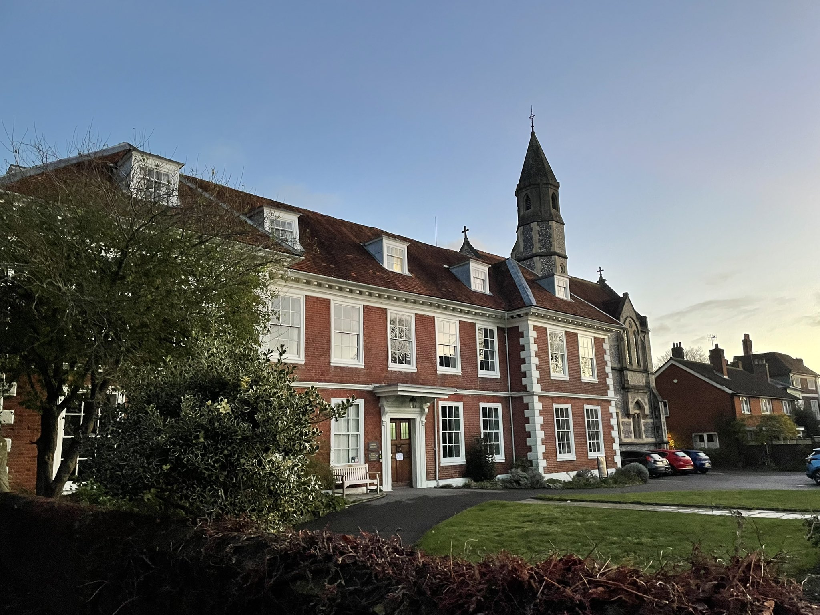
The photo is of what is now known as Sarum College, the place where I did my Theological training prior to Ordination from 1971 to 1974. When we, my wife and I, first went there it was Salisbury Theological College and the Principal was Canon Harold Wilson – “not Iscariot” as used to be said – and who remained as Principal until just before we left. Later he went off to be a Canon at St Paul’s Cathedral in London, but died there shortly afterwards. A nice man who loved children and reduced our youngest to helpless giggles on more than one occasion. By the time we actually started there it had become Salisbury and Wells Theological College as theological training in the Church of England went through one of its periodical spasms or reorganisation, only to close altogether some years after we left. It taught me a great deal, not least, how to write essays, but was not without its faults like most institutions. I think it was probably most “collegiate” for those who lived in or nearby, but for the married men with families who attended for lectures and seminars and such events as they could get to it remained a place that you attended, rather than as the Prin would have liked, a community to which one belonged. We were supposed to observe the daily offices, as indeed all clergy are bidden to do, but how you do this as a member of a family with young and active children who think religion is bunk, I never discovered, then or later.
From the “Church Times of 5 July 2013 . . .
“When former students of Salisbury Theological College held a reunion earlier this year for those ordained 40 years ago, there was much talk of Canon Harold Wilson (1919-75), their extraordinary college Principal. They credit him with making the college (which merged with Wells) “one of the most forward-looking in the country”.
It was the variety of people which amazed the Revd Robert Prance on his arrival as an ordinand in 1969. “On that first day, my hand was shaken by a former, highly articulate housemaster of a famous public school, while the same hand was shaken by a young motorbike mechanic whose colourful language informed me that there were “still a lot of f***ing virgins in the College”.
“There were academics from Oxbridge, and others who had barely an O level to their name,” he says. “There were representatives from all trades and professions, the armed forces, and some came direct from university. There was also a huge variety of churchmanship, from the extreme Anglo-Catholic to the more Evangelical – these all combined with men of liturgical tastes, both conservative and radically modern. But had you asked people why they had chosen Salisbury, it was nearly always because of Harold.”
Canon Wilson, a former fashion designer with the “face of a tired but contented bloodhound” and a “gently nasal north-country voice”, famously dressed in bright shirts and ties, and sprawled at academic seminars as though he were sunbathing. “Whatever the calibre of speaker, he would always haul himself to his feet and respond: ‘I’m sure we’re all very grateful to . . .'” Mr Prance recalls with affection.
Here was a man who had taught himself to skim-read, and was reputed to get through three books a night before turning out the light. He was a fount of knowledge, and his house was “a veritable library” of carefully categorised books.
Canon Wilson followed Canon Freddie Tyndale as Principal, and continued to treat him with warm respect, the students remember, despite strong differences of opinion, and Dr Wilson’s having “turned the college on its head, including allowing married clergy regular access to their wives”, Mr Prance says.
The college was, in many ways, a very liberal community, but with “an element of benign dictatorship which it was unwise to question”, he says. The Principal could be “moody, bad-tempered, stubborn, and occasionally even rude if it was a bad day”. He recalls the time when “Wee Gordon” Reid, then the Chaplain, had bought himself “an extremely fetching cotta, which dripped with High Church lace.
“As he came out to conduct evensong for the first time, wearing the prized vestment, Prin’s voice rang out from the back of chapel, ‘You can go back to the vestry and change out of that bloody Italian rubbish.’ Gordon meekly obeyed, hugely embarrassed. Amazingly, no offence was taken. And we students didn’t get off lightly if we were behind with work, or late for chapel, or led an act of worship badly.”
Working in groups included the daily office, and Dr Wilson would drop in unannounced to any of these sessions, including matins, which was said around the bed of one student with a genuine problem with getting up in the morning. “On such occasions, he simply took us as we were, happy to sip coffee over the Venite or Te Deum,” Mr Prance says.
“He made it clear that from Monday to Friday he expected nothing but the best from us – ‘I don’t want any student of mine going out to parish life without knowing how to work hard.'” But weekends were free time, and many students chose to worship in the cathedral.
Students in genuine financial hardship found the shortfall met out of Dr Wilson’s own pocket. Generosity was demanded. The sum collected and put on the offertory plate to buy bicycles for Sudan drew silence from Dr Wilson, and then a growl from the altar steps: “Two bloody bicycles! Two bloody bicycles!”
“He stopped the service,” Mr Prance says, “and told us we would resume in an hour, by which time he expected the sum to be doubled.”
Students remember the vivid colours of his vestments, some of which he left to them in his will. They were stunned by his early death in 1975, at the age of 56, and most were in tears at his requiem in St Paul’s Cathedral. He had gone to St Paul’s as Canon Chancellor, after pressure and ill-health forced his departure from Salisbury.
“On my last visit to him,” Mr Prance says, “he told me rather sadly, ‘They’ve put me here because I’m too bloody dangerous anywhere else.’ I didn’t believe him; but it was clear he missed his students, and being our benevolent boss and friend.” “

